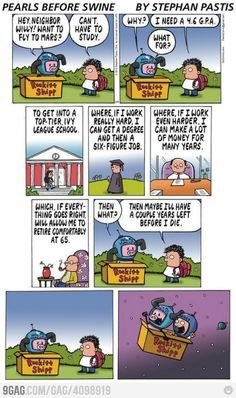I was somewhat logical as a child
After getting tired of school, I asked my parents why I was going
They said to get an education to get into university
Then what?
To get a degree and work for a good company
Then what?
To make money
I asked if I could skip the years of pointless classes and study money. Just take a shortcut
They said it didn’t work that way
I thought this method was BS. My rationale was that, if this path was so great why did people who followed this path complain about not having enough money? Why weren’t all my parents friends rich?
They were all penny-pinching old people with very little money. Often their biggest “investment” was their primary residence. No thanks
My parents were wrong. It did work that way. I studied money and found out that the path that my parents advocated was one of the absolute slowest and most painful way to build wealth. Not their fault. They didn’t know any better
Today I make sure that my child realizes that school is just a made-up game and to not stress about school. 99% useless
My child is more interested in our properties and how to acquire, manage, and cash flow them because this knowledge is more useful to wealth-building than anything she will ever get from sitting in class. Later we can discuss stocks, dividends, and taxes. School is for meeting friends, hanging out and having fun

